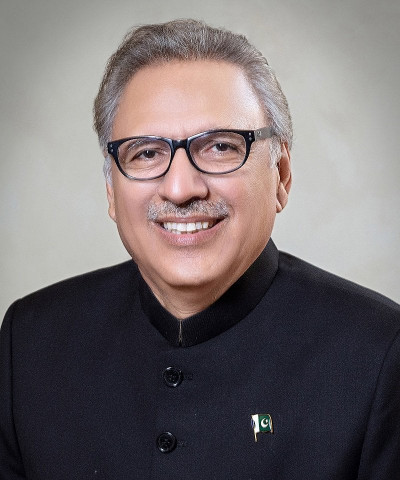‘Pakistan on tipping point of socioeconomic development’
PM’s hepatitis screening programme for 140 million Pakistanis launched

To purge the country of deadly diseases, he said that it was imperative to depoliticise the health sector. President Arif Alvi. PHOTO: PID
He said this while addressing a national conference on ‘Invest in Eliminating Hepatitis from Pakistan’ in connection with World Hepatitis Day.
President Dr Alvi said that the prevalence of hepatitis B and C in Pakistan was alarming with 15 million to 20 million people infected respectively.
The vehicle to transmit the virus for both, hepatitis and the human immunodeficiency virus (HIV) was the same —unsafe blood transfusion and reuse of syringes.
This, he said, needs to be tackled to avert the situation worsening.
Dr Alvi proceeded to give the example of Egypt who had brought down its hepatitis prevalence from 13 per cent to just three per cent in just 10 years. He added that if Egypt could do it, so could Pakistan.
However, the president strongly advocated focused efforts on preventing the disease, terming it far cheaper and more effective than any cure.
The conference also marked the launch of the Prime Minister’s Policy Package for Elimination of Viral Hepatitis from Pakistan which would ensure the screening of around 140 million people for hepatitis and provide the infected with free medical treatment.
National health data shows that the country has a 10 per cent HCV prevalence or around 20 million are anti HCV positive. The remaining near 80 per cent will show the virus and need treatment. Per these estimates, around 16 million cases will require Direct Acting Antivirals and 12 million will be cured.
Dr Alvi, however, lamented that health practitioners of the country were not taught how to treat patients and they resort to prescribing the minimum possible medicines, particularly antibiotics and injections.
In this regard, he said that it was imperative to raise awareness against the viral diseases such as hepatitis and HIV through physical interactions such as Lady Health Workers (LHWs), besides using various media tools including electronic and social media, the outreach of non-government organisations and seminars.
The president noted that despite a paucity of resources, the country was doing its best to eliminate the viral disease despite resource constraints and added that investment in education and health sectors could lead the country towards real change.
Special Assistant to Prime Minister on Health Dr Zafar Mirza said that thousands of people are infected with hepatitis every year due to lack of prevention, testing and treatment resources apart from inadequately-screened blood transfusions improperly sterilized invasive medical devices and unsafe injections.
He added that Prime Minister Imran Khan had an ambitious plan to eliminate viral hepatitis B and C infections from the country by 2030 and that it was aimed at providing leadership and coordination to provincial programmes in scaling up hepatitis prevention, testing and treatment services.
In an eye-opening revelation, Dr Mirza said that in Pakistan, more than eight injections per capita are administered and around 95 per cent of those are unnecessary.
He added that Pakistan has the highest ratio of hepatitis prevalence in the world while most of the factors for the spread of the virus originate from the healthcare system including the unsafe blood transfusion and reusing syringes.
To solve this, SAPM on health said that they were working on developing a National Blood Service to ensure screened blood is used for transfusions.
He also expressed the commitment to redesign the Hepatitis Control Programme in the spirit of the 18th amendment, claiming that the programme had weakened after devolution of the health sector.
Dr Mirza explained that Pakistan actually produces very cheap medicines to cure hepatitis C infections within three months, but very few people in the country know that they are even infected and thus, do not attempt to access testing and treatment facilities. Hence, a disease surveillance system will be developed to collect real-time data for early intervention.
To purge the country of deadly diseases, he said that it was imperative to depoliticise the health sector.
According to WHO, 23,720 people died of hepatitis-related causes in Pakistan in 2016, which compares to a bus full of 64 people every day. The WHO expressed its full support for the Pakistani government in implementing its plans to eliminate hepatitis B and C.
WHO Universal Health Coverage for Communicable and Non-communicable Diseases Assistant Director-General Dr Ren Minghui underlined the importance of using integrated approaches and many existing opportunities and innovations that can support Pakistan achieve its ambitious but necessary goals.
WHO EMRO Regional Director Dr Ahmed Salim Saif Al-Mandhari also acknowledged Pakistan’s response to the hepatitis scourge.
Pakistan’s efforts will help strengthen basic health systems in the country and could serve as a positive example for other countries in the region, which had the highest prevalence of hepatitis C in the world and ranks second in the prevalence of hepatitis B, he said.
WITH ADDITIONAL INPUT FROM APP
Published in The Express Tribune, July 29th, 2019.


















COMMENTS
Comments are moderated and generally will be posted if they are on-topic and not abusive.
For more information, please see our Comments FAQ